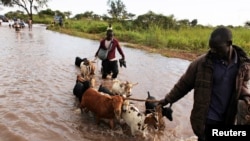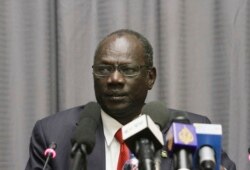President Salva Kiir has declared a state of emergency in parts of South Sudan where flooding has displaced more than a million people.
Most South Sudanese affected by floods are in the Bahr el Ghazal and the Upper Nile regions. At a news conference Wednesday in Juba, Minister for Humanitarian Affairs and Disaster Preparedness Hussein Maar Nyuot said the floods have destroyed hundreds of farms.
"The impact of the floods on the livelihoods of our people is that farms are completely washed out. So there is a serious crop failure and their houses and homesteads are completely submerged under water," Nyuot said.
Flooding, which occurs every year around this time, has reached unprecedented levels this year, according to local and state officials. Many South Sudanese have been coping with floods since July.
Information Minister Michael Makuei told reporters that Kiir declared a state of emergency "to enable the government and other institutions, other governments of goodwill, to render services."
The hardest-hit areas of flooding are in the Bahr el Ghazal region of Lol, Gogrial, Twic Tonj, Abyei and parts of Aweil state, according to Makuei.
In the Greater Upper Nile region, Maban, Longechuk, Maiwut, Ulang, Fangak, Nasir, Ayot, Boma state, Duk, Nyiro, Bor and Akobo are particularly hard-hit. In the Equatoria region, Terekeka, Mangala, Rokon and Lafon have experienced the worst flooding, said Makuei.
Makuei said the national government is mobilizing resources to reach out to the affected population, but he did not elaborate.
"Even if we begin to move today, we will not be in position to reach all the areas. This is why we are appealing to the region and international community to move in also on the other side while the government covers the other side," Makuei told VOA.
Nyuot said he met with officials from several aid agencies to ask for financial support to aid flood victims, but was told their funding for this financial year has ended.
"I hope the government, and I believe the president, will also commit some resources towards these. As a responsible government, we need to give our contribution before we ask other people," Nyuot said.
The U.N. Office for the Coordination of Humanitarian Affairs, or OCHA, said last week that since July, 908,000 people have been affected by abnormally heavy seasonal floods across the country.
OCHA said scores of villages and towns across the country are under water, including health facilities and nutrition centers in those areas.
OCHA said a lack of access to basic services including proper sanitation has increased the spread of disease due to contaminated water.
More rain is expected in November, which Nyuot said will worsen conditions for the affected populations beyond harvest time.
"There will be real famine, there will be hunger, because people have not harvested, because their farms are washed out by water and their animals are dying," Nyuot told VOA's South Sudan in Focus.






